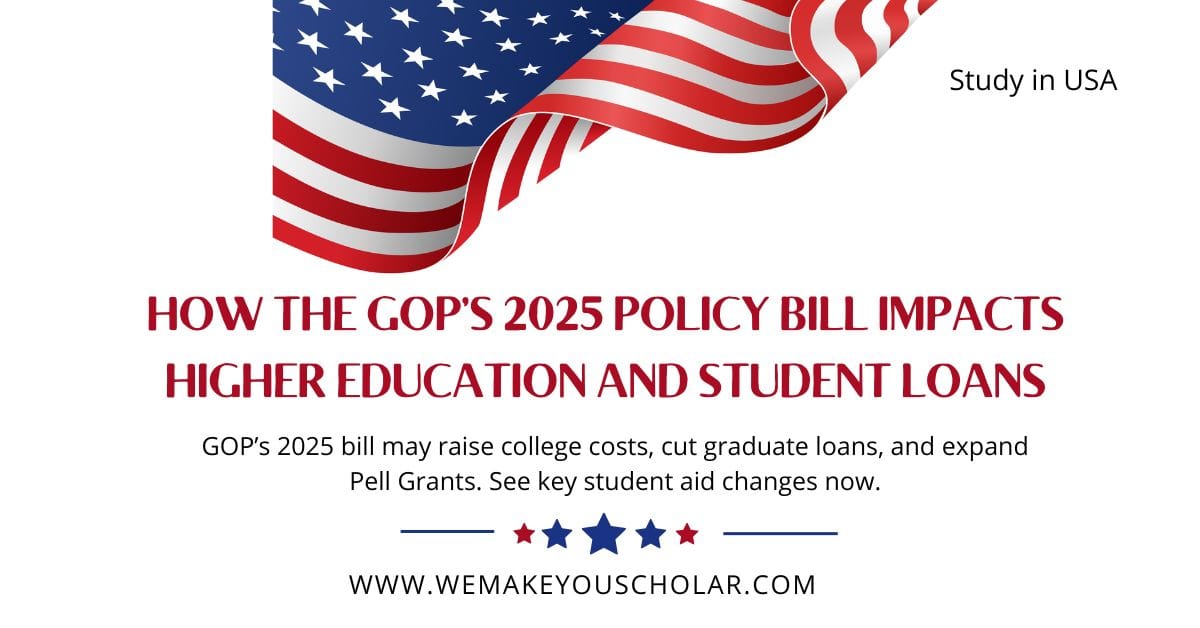How the GOP’s 2025 Policy Bill Impacts Higher Education and Student Loans
In July 2025, Congress passed a Republican-backed policy bill with a majority that will reshape the education system of higher education in the United States.
This bill will impacts all students from graduate student loan caps to endowment taxes. It could surely influence to consider to who gets to study, where, and how.
While some say it will impact transparency and accountability and limits excess borrowing, education experts fear that it could reduce access and diversity.
Let’s explore the key impacts of the Republican Higher Education Policy 2025 and what it means for students and universities.
Student Loans: Tighter Limits, Fewer Options
Graduate students will face new caps on federal borrowing. Master’s students can borrow no more than $100,000, while doctoral students are capped at $200,000.
Previously, students could borrow nearly unlimited amounts under Grad PLUS loans. However, this program will now be phased out.
Supporters argue that the changes will discourage high tuition inflation in graduate schools. They claim it will promote financial responsibility.
However, many students may now need private loans—which lack federal forgiveness options and often carry higher interest rates.
In fields like medicine, where average debt exceeds $240,000, this change will definetly support aspiring professionals, especially from low-income backgrounds.
Program Value Will Affect Loan Eligibility
In another bold move, the bill ties federal loan eligibility to the financial outcomes of degree programs.
If a program’s graduates fail to meet certain income thresholds, that degree becomes ineligible for federal student aid.
This policy aims to discourage degrees that do not lead to strong earning potential. However, critics argue it penalizes important fields.
Careers in social work, education, or the arts may see fewer students due to financial inaccessibility under the new model.
As Jon Fansmith from the American Council on Education said, “People don’t pursue social work to get rich.”
Expanded Taxes on University Endowments
Another major change includes increasing taxes on university endowments. Institutions with over $2 million per student will face an 8% tax on investment income.
This targets elite schools like Harvard and Princeton. The goal is to push them to reinvest more in students, rather than in stockpiles.
Previously, only schools with $500,000 per student faced a 1.4% tax. Now, the impact will be much broader among elite institutions.
Opponents argue that this will reduce funding for scholarships and research. They claim the tax is politically motivated and economically ineffective.
In this bill, an exception was made for colleges with fewer than 3,000 students—largely benefiting conservative institutions like Hillsdale College.
Pell Grants: Now for Vocational Programs
Amid budget cuts and loan limits, there is some positive news for community colleges and vocational training programs.
The bill expands Pell Grant eligibility to include short-term, workforce-related certificate programs.
Now, students learning trades such as forklift driving, cloud computing, or HVAC can receive federal aid.
This bipartisan measure supports job readiness and nontraditional learners. It was a rare point of agreement between the Senate and House.
However, plans to allow Pell Grants for unaccredited programs were removed by the Senate parliamentarian.
Medicaid Cuts and Work Requirements: Indirect Consequences
The bill also includes drastic changes to Medicaid. These cuts may hurt students who rely on government healthcare while studying.
New work requirements could especially burden low-income students juggling jobs, family, and academics.
Many fear that this combination of reduced aid and increased requirements may push vulnerable students out of higher education altogether.
What Higher Education Leaders Are Saying
Lynn Pasquerella, President of the American Association of Colleges and Universities, warned the bill could reduce economic and racial diversity.
“By limiting loans and taxing aid sources, we risk shutting out students who can’t pay out-of-pocket,” she noted.
At the same time, Republicans contend that colleges have not managed their own expenses properly or been accountable enough.
Republicans portray the bill as an overdue course correction to ensure that education money is spent on “worthwhile” programs and outcomes specially in countries current financial position.
Final Thoughts: A Changing Landscape
The Republican Higher Education Policy 2025 bill introduces significant change and shifts in how American future education will be funded and structured.
Although it retrict excessive borrowing and supports vocational pathways, it also raises concerns about affordability, diversity, and academic freedom due to limited resources as compared to previously.
Students, families, and institutions must now navigate a more complex and restricted aid environment.
Frequently Asked Questions (FAQs)
1. Can I still get student loans under this new policy?
Yes, but loan amounts are now capped, especially for graduate students. Grad PLUS loans will also be phased out.
2. Will my degree program be eligible for aid?
If your program’s graduates earn below a set income threshold, it may lose federal aid eligibility. Check with your institution.
3. Are Pell Grants still available for college degrees?
Yes, and now they’re also available for short-term training programs. However, not all programs will qualify.
Want more updates like this? Visit wemakeyouscholar.com and subscribe to our WhatsApp Channel for alerts on scholarship changes, education policies, and funding news.




